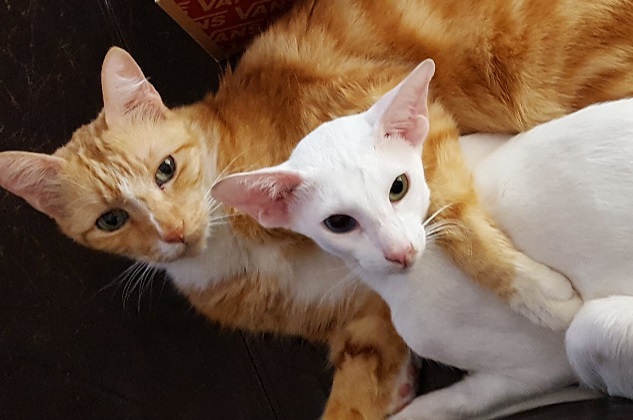COVID-19 Transmission in Cats
As we begin 2021 and remain in the midst of a global pandemic, we wanted to revisit the topic of COVID-19 in animals. In previous blogs, we discussed the spread of the novel coronavirus from humans to animals and from animal to animal. While we know that animals can become infected with COVID-19, the CDC continues to report that there is no evidence that animals play a significant role in the spread of the virus.
COVID-19 in Animals
You may remember that the first reported case of a pet with COVID-19 was a dog in Hong Kong. From there, more reports emerged of animals infected with the virus. In the United States, the first report of a COVID-19 positive animal was a tiger at the Bronx Zoo. Several other large cats at the facility went on to test positive in the following weeks. After that, it was two cats from separate households in New York, both of which likely contracted the virus from a COVID-19 positive owner. At the time, I remember wondering about the link between cats and COVID-19 and whether there was any significance there.
As the weeks and months went on, more and more reports of COVID-19 positive animals came out. Dogs, cats, minks, more exotic large cats. As of late December 2020, the USDA reported a total of 11 exotic cats (tigers, lions, and a snow leopard) and 54 domestic cats in the United States tested positive for COVID-19. This in comparison to a total of 38 COVID-19 positive dogs.

Cats Infected with COVID-19
While it is clear that some animals are more susceptible to the virus, there isn’t much information regarding COVID-19 within specific species. For instance, it is not currently clear how many COVID-19 positive cats experience symptoms. It appears that some cats have symptoms while others are asymptomatic. But we do not yet know why that is the case.
We also do not know the death rate in cats with COVID-19. There is news that a cat in Pennsylvania that had COVID-19 was humanely euthanized due to respiratory distress. There was another cat in Alabama that passed away and was COVID-19 positive however information suggests that the cat had additional health issues that were more likely the cause of death. Fortunately, it does not appear that cats are at high risk of death from COVID-19 infection. But more studies are necessary to understand how this virus affects our four-legged companions.
COVID-19 Transmission in Cats
In November, a study out of Kansas State University confirmed some of my suspicions regarding COVID-19 transmission in cats. The study concluded that cats infected with SARS-CoV-2 (the virus that causes COVID-19) can be asymptomatic and still easily spread the infection to other cats. The study found that the virus is shed through an asymptomatic cat’s nasal, oral, and rectal cavities and that they can infect other cats within 2 days of contracting the virus.
While more research is needed, this information is crucial to understanding how the virus is transmitted in cats. And though we mentioned it before, it is worth repeating: there is still no evidence that animals play a significant role in spreading COVID-19 to people. There is, however, significant evidence to suggest people spread the virus to animals. So, if you or a family member is suspected to have, or tests positive for, COVID-19, the CDC recommends avoiding contact with your pets.
More Studies Are Needed
There is still so much to learn about the novel coronavirus. More studies are underway to determine how this virus operates and what we can do to keep everyone, both ourselves and our pets, safe. For now, we will continue to do our best to keep ourselves and others healthy. At VetStem, we continue to follow our local ordinances by social distancing, wearing masks, and requiring employees to stay home if they have symptoms or exposure. Though these are scary and uncertain times, we hope that the start of 2021 finds you and your loved ones, two- and four-legged, happy and healthy.
